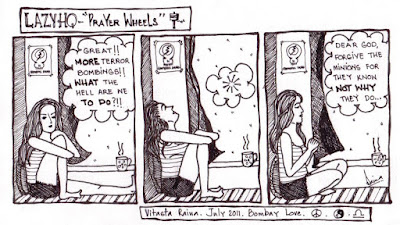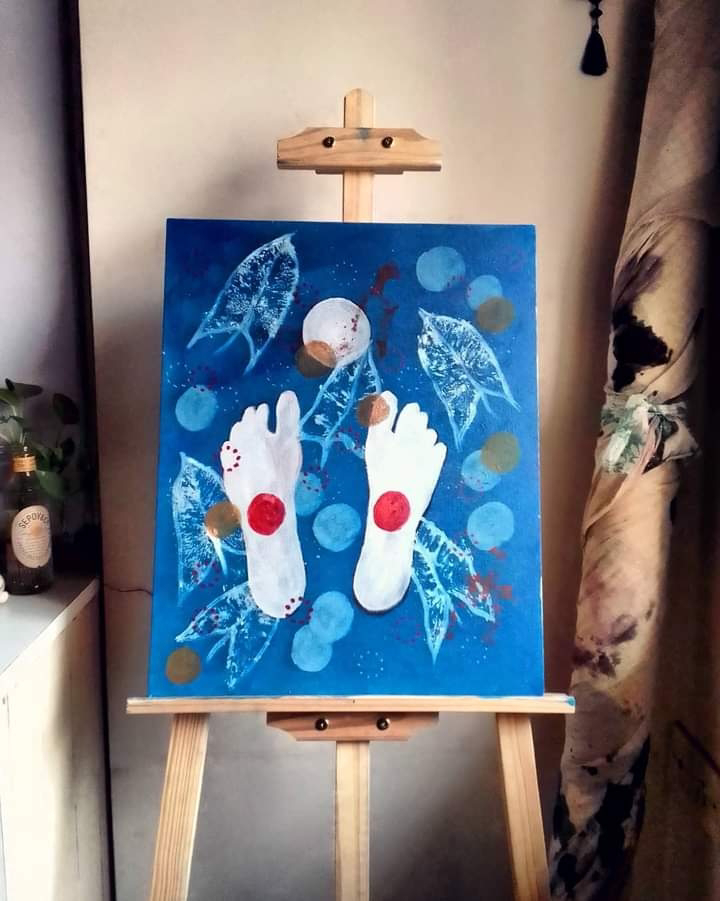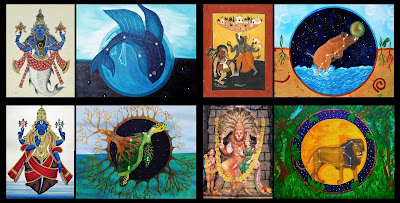Social Media and Belonging
From the desk of Vitasta Raina
Ajourd'hui, c'est vendredi, mais j'ai ecrit ceci dernier dimanche. And it has taken me a while to actually get down to polishing and posting it, and before I do so, I just want to acknowledge the impacts of the coronavirus on my mental health, and though outwardly I seem to be handling it well, there are times when I struggle, and I think it is important in these times to reach out to friends and family who may be coping with underlying issues of depression, anxiety and psychosis.
Anyway, since we are on the last few days of the 4th lockdown, and I am trying to push out as much creative content as I can, I decided to write a bit about my journey of 'activism on social media'. I don't really engage a lot with political or social activism, and I hardly ever post about such issues on social media, and it's not because I am not "outraged" or "deeply affected" by happenings, at home or around the world, I just feel as though 'adding my voice to the current stream of trending topics' is not really going to make much difference. I think this has more to do with my personality, than to do with my political beliefs. But there have been times in my life when I have been an active part of an 'online phenomenon', and today, I want to write about the very first time in my life when I responded to an event.
Disclaimer: This post is going to be 'triggering' for some, and will raise a debate, depending on your stance, and I have for the most part, tried to bring in a balanced perspective, particularly now, since it has been many years since the event in question.
Social Media and Belonging
I didn't have any social media barring my old Facebook account and my blog (Mumbai Microcosm), a version of which is probably preserved on the Wayback Machine.
This period in my life, I was a bit 'dazed and confused'. I had just quit my job as an urban researcher at Future Institute, and I wanted to start something on my own, but I lacked direction and focus. I was also coming to terms with my personal circumstances, being in a relationship that was killing my soul, slowly draining every ounce of happiness and sanity from my life, and my usual escape into art was at that time, absent. I guess I was absorbed solely by my internal depression, unable to connect with anything or anyone outside the boundaries of my mind.
That's when it happened. The attack on Charlie Hebdo. This single incident of mindless violence against cartoonists shook me to the very essence of my being, and for the first time in years, I cried. I lived in New Delhi then, very far from 'the spleen of Paris', but I cried for those fallen comrades, people I had never met, nor had even known the existence of prior to the event, but I could not stop thinking about them. And in that moment, I knew that I needed to let "the world" know that we were in this together.
I had not made a cartoon in a good while at that point in time, but I dug up an old cartoon I had drawn for a similar terror event that occurred in my city of Mumbai in 2011, and I created a Twitter account, and for the first time in my life, I used a hashtag: #Jesuischarlie.
 |
| Lazy HQ for the Mumbai Terror Attacks I used to frame my #jesuischarlie point of view in 2015. |
I didn't know if it made a difference at all, but I knew it was something I needed to do. And I did it silently. And I did it for myself, and I did it for the unknown artists who lost their lives for scribbling some lines that some men couldn't bear. Some people justified the action of shooting cartoonists in cold-blood saying they were disrespectful, that they are guilty of 'Hate-Speech', but if they were so hurt, couldn't they make and circulate disrespectful cartoons themselves instead of shooting others?
But it opens up a very interesting debate between 'Freedom of Speech' and 'Hate Speech'. 'Freedom of Speech' can be defined as "a principle that supports the freedom of an individual or a community to articulate their opinions and ideas without fear of retaliation, censorship, or legal sanction.". It is recognised as one of the fundamental Human Rights.
Hate Speech, on the other hand, is defined by the UN as "any kind of communication in speech, writing or behaviour, that attacks or uses pejorative or discriminatory language with reference to a person or a group on the basis of who they are, in other words, based on their religion, ethnicity, nationality, race, colour, descent, gender or other identity factor."
So, now we have to question whether Charlie Hebdo was guilty of 'hate-speech', and if in fact it was, whether the attacks were then, justified. I don't believe so. But, it is certainly true that the magazine was guilty of 'bullying' a community based on their religious beliefs, and for purposefully and repeatedly offending the community's faith. I believe that there should have been a legal/civil remedy for this offense, that they could have approached the Law to get the magazine terminated, but I am rather naive in matters of politics and diplomacy, and the only thing I understand is that 'killing' someone who is offending you is not the way civil society can function.
Often in arguments people attack the speaker rather than the content of what is being spoken, and when you see this happening, you should immediately be aware that they have no merit, nor even a working understanding, of their own arguments and set of beliefs. But that being said, why would you continue to go out of your way to offend someone? Is that the only thing 'freedom of speech' boils down to?
And this, to some extent also points a finger at the Citizenship (Amendment) Act, 2019, but in this case it's not a fringe, satirical magazine but rather an elected, democratic government which is engaging in 'bullying' language. First, with the intention of giving historically persecuted religious minorities in Muslim majority neighbouring countries of Pakistan, Afghanistan and Bangladesh sanctuary in the country, the Act has omitted the minority Muslim groups, such as Hazaras and Ahmadis, from its vocabulary; and secondly, by omitted the neighbouring country of Myanmar, they have excluded the Rohingya refugees from benefiting from the Act, thus, making it pointedly clear that it is discriminating against the Muslim community. While I am not sure what the outcome of this Act would be in coming years, the violence that erupted across the country as a result of its establishment is testament to its inherent divisive nature. Either the Act should include all persecuted minorities irrespective of their religion, or it should simple be abolished.
Returning hate for hate multiplies hate, adding deeper darkness to a night already devoid of stars. Darkness cannot drive out darkness; only light can do that. Hate cannot drive out hate; only love can do that. - Martin Luther King, Jr.
*
Listen, the period of my life after Jan 2015 till I left the bewildering city of New Delhi was interesting, cruel, haphazard and entirely strange, and there are still days when I think back to them, and think about my life, and think about moments in my life when I was forced to question my existence in a cocoon, compelled to look at life beyond my daily misery, and driven enough to do something about it, even if it was as small an action as setting up a twitter account and posting a cartoon.
P.S.: The only other time I have made a tribute cartoon was just a few weeks later, on 26th January 2015, when "The Common Man" of India passed away. I used the same twitter account.
 |
| A sad day for crows. Vitasta. Jan 2015 * |
🌸🌸
Bombay Love
Et, je suis toujours Charlie.
*


Comments
Post a Comment